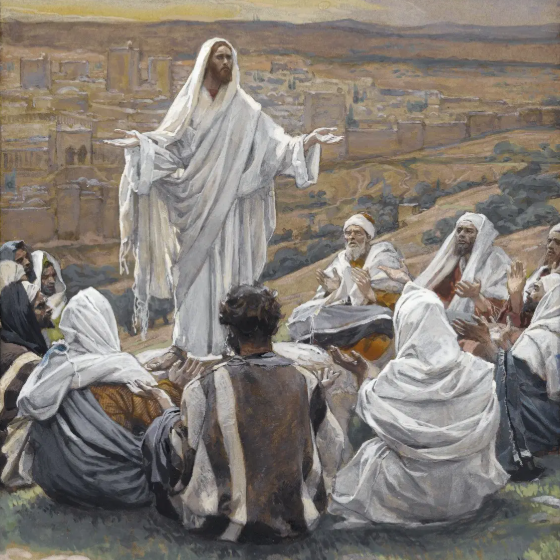
Just as in the last two Sundays, today’s Gospel puts us in Christ’s school to learn from him another fundamental aspect in the life of discipleship: the action of praying. I use here intentionally the verb and not the noun (prayer), because Jesus’ teaching in this regard in today’s Gospel passage seems to want not so much to clarify the concept in the minds of the disciples as to help them form in themselves a habit of praying, as their teacher practiced. From among the Evangelists, it is no coincidence that St. Luke alone emphasizes that it all begins with a particular time context, “Jesus was praying in a certain place, and when he had finished, one of his disciples said to him, ‘Lord, teach us to pray.’” This proved to be a favorable time for the Master of Nazareth to impart to his disciples, by example and in words, the three essential points to follow in their praying.
1. “Father, Your Kingdom come.” The Priority of Praying for the Coming of the Kingdom of God.
Firstly, Jesus teaches his disciples to pray to God with a short text, later called in the Christian tradition the Lord’s Prayer. Unlike the version in Matthew’s Gospel, which is used in the Church’s liturgy, Luke’s version is shorter and contains only five invocations, instead of seven as found in Matthew’s version. Two invocations deal with divine reality and three with human reality. Each phrase of this precious and unique prayer text, which Jesus taught his disciples, contains an immense richness to be discovered and deepened. (I invite you to read the part dedicated to the Lord’s Prayer in the Catechism of the Catholic Church [nos. 2803 et seq.]). Let us recall here the most important aspect, concerning the “missionary” character.
Indeed, in both versions, after addressing God as “Father,” which puts the one who prays in a special filial relationship with God, the prayer begins with two parallel requests: that of the sanctification of his name and that of the coming of his kingdom. They are in some ways complementary, for there where God reigns, His “name,” meaning He Himself, is “hallowed” and “glorified,” that is, recognized and adored as holy. (cf. Catechism of the Catholic Church no. 2807). In these initial invocations, we glimpse the great desire for God’s saving plan for us that Jesus constantly carried in his heart and now wants to convey to his disciples. He himself proclaimed from the very beginning of his public activities that “the Kingdom of God is at hand” or, even better, “has come nearer” in a dynamic way.
It should be clarified that the coming of the kingdom of God does not mean the establishment of a territory with visible boundaries under God’s direct control. Rather, such coming implies that God reigns over his people and, generally, in the hearts of men and women, precisely in accordance with the Old Testament tradition, which uses the verbal expression “God rules” much more frequently than “Kingdom of God”. The same Old Testament texts also express the expectation of the day when God will come to reign over everything and everyone. In this way, the invocation of the coming of the kingdom of God actually calls for God to carry out his plan of salvation in the world.
The Lord’s Prayer, therefore, shows itself to be above all a “missionary” prayer. Those who pray it share the same desire of God, which is then also that of Christ, for the fulfillment of the missio Dei, that mission of God for the happiness of humanity, which has now come in the fullness of time with the coming of Jesus. Those who pray it also wish for themselves and for all humankind the sweet “yoke of the kingdom,” that God may reign in their lives as well as in the lives of every man and woman in the world. Such prayer is, par excellence, the first action of mission.
2. Praying with Insistence and Filial Trust
Secondly, Jesus teaches how to pray to God with insistence (“intrusiveness”) and filial trust. He does this through a short parable, which reflects various aspects of the culture of his people: the arrival of the friend without any notice “at midnight” from a trip (there was certainly no mobile phones at that time), staying in bed with or near the children (according to the structure of the house at the time), hence the fear of waking them up by getting up, and especially the strange fact that the master of the house did not think of the possibility of punishing his intrusive friend by calling the “police”.
In any case, as is clear from the literary context, the attitude of insistence in praying seems to be recommended not so much for every need of the person praying, sometimes only according to his human needs, but precisely in view of the request for essential things that Jesus had taught in the Lord’s Prayer, particularly that invocation for coming of the kingdom. Such a perspective will also apply to Jesus’ statement later on, which has been repeatedly misunderstood and abused: “ask and you will receive; seek and you will find; knock and the door will be opened to you. For everyone who asks, receives; and the one who seeks, finds; and to the one who knocks, the door will be opened” (Lk 11:9-10). What should we ask for? What are we seeking? Upon whose door do we knock? Jesus’ response is clear: “But seek first the kingdom [of God] and his righteousness, and all these things will be given you besides” (Mt 6:33).
3. “Praying” All Oriented to the Gift of the Holy Spirit
Finally, Jesus concludes his “catechesis” on praying by pointing to the Holy Spirit as the supreme good to ask for and receive from God: “If you then, who are wicked, know how to give good gifts to your children, how much more will the Father in heaven give the Holy Spirit to those who ask him?” (Lk 11:13). This is already glimpsed from the parallelism between “good things” that an earthly father knows how to give to his children and “the Holy Spirit” that the heavenly Father will give to those who ask for it. The thought emerges even more clearly when comparing this version of Jesus’ saying with the one in Matthew’s gospel, which makes the saying more straightforward and more logical, “If you then, who are wicked, know how to give good gifts to your children, how much more will your heavenly Father give good things to those who ask him” (Mt 7:11).
In this way, Jesus’ teaching in the Lucan version is even richer because it orientates everything toward the greatest gift God can bestow on humanity: the Holy Spirit who purifies, sanctifies, and guides every man and woman into life with God, and in God. Where the Spirit is, there God is present and reigning, and there the kingdom of God is present. Therefore, praying to God for the gift of the Holy Spirit actually amounts to praying for the coming of the kingdom of God in ourselves. It will also be the Spirit who will help us enter more and more into the filial relationship with God whom we now call “Abba, Father” (cf. Rom 8:15-16), just as Jesus taught us.
So let us ask to be given always and even today this supreme gift of God that is the Holy Spirit, with the assurance that God our Father in heaven will give it to us. And “led by the Spirit of Jesus,” may we daily raise to the Father the essential invocations of the Lord’s Prayer with insistence and filial confidence, pleading with all our strength that God’s kingdom will come among us. Amen.


